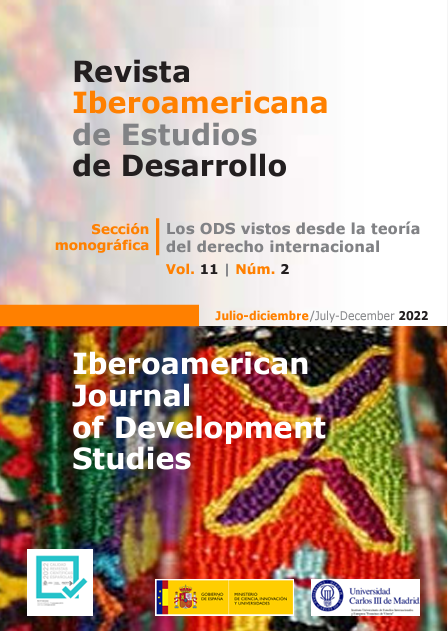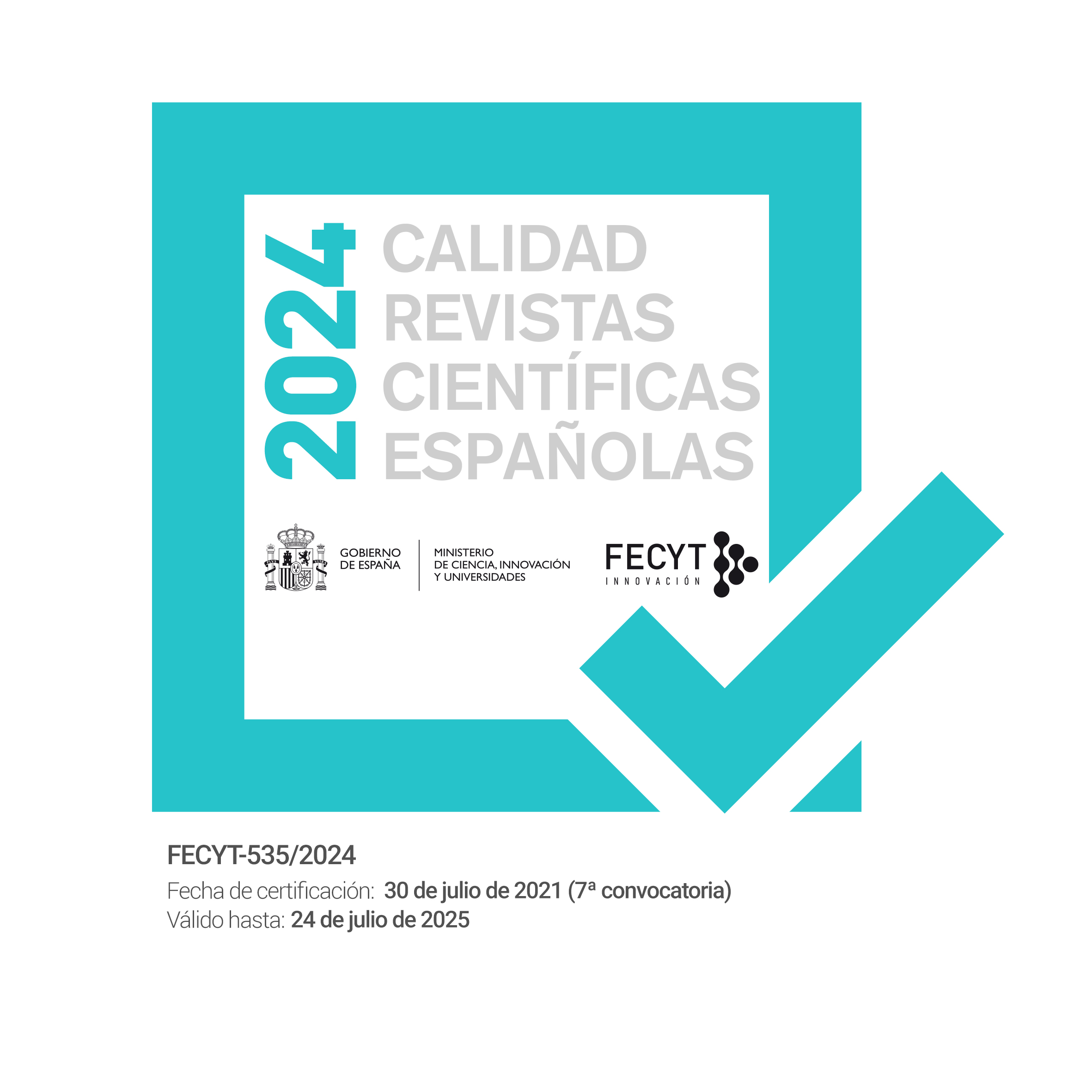Decisions taken by States with authoritarian governments: economic basis and perspectives on SDG 16
DOI:
https://doi.org/10.26754/ojs_ried/ijds.687Keywords:
human rights, rule of law, SDG 16, economic principles, European UnionAbstract
This article initially analyses the theoretical possibility that the terms «rule of law» and «human rights» in the Treaty on European Union (TEU) can be analysed from the perspective of the Economic Analysis of Law (EAL). It then focuses on the economic principles underlying decision-making to appreciate, under that perspective, the choices made by States, both at the national and international level (which could also include the commitment to the SDGs). From there, the study is oriented more towards SDG 16 proposing, summarily, to denominate with the terms «horizontal» and «vertical» two different basic perceptions on its three main areas (peace, justice, and strong institutions) and tentatively uncovering their possible impacts on the rule of law and the rights and freedoms of specific groups (e.g., LGBTQIA+ community, immigrants, refugees, etc.). It is suggested that, while the «horizontal perception» presents a socially inclusive role, the «vertical perception» tends to be more exclusionary. Seeking congruence with the above, it is also suggested that a biased perception of SDG 16 (associated with the «vertical» vision) could help authoritarian States in the exaltation of their nationalism, without forgetting that international public order, often wielded as an expression of national sovereignty, can serve as a «defensive shield» against alleged «attempts to alter» the fundamental values of the State and of the Christian roots of their societies. Simultaneously, observation of everyday political life seems to suggest that public order can be altered to the liking of populist political parties. The result seems to reveal a growing dichotomy between values (European vs. national), public orders (European, albeit incipient vs. international and domestic), and types of democracy (liberal vs. illiberal). As incidental and illustrative examples, the authoritarian drifts in Hungary and Poland are included in the study.
Downloads
References
ALVARES GARCIA JÚNIOR A (2021). Sustainable Development Goals, Rule of Law and Public Policy: Implications for the Traditional Family Model. Cuadernos de Derecho Transnacional 13(2):934-955.
AYTAÇ E, ALI Ç, EZGI E (2021). Partisanship, elite messages, and support for populism in power. European Political Science Review 13(1):23-39.
BAIN PG, KROONENBERG P, LARS-OLOF J, MILFONT TL, CRIMSTON CR, KURZ T, BUSHINA E (2019). Public views of the sustainable development goals across countries. Nature sustainability 2(9):819-825.
BARR N (2020). Economics of the Welfare State. Oxford University Press, Oxford.
BIRÓ P, GUDMUNDSSON J (2021). Complexity of finding Pareto-efficient allocations of highest welfare. European Journal of Operational Research 291(2):614-628.
BLAIR R (2021). UN Peacekeeping and the Rule of Law. American Political Science Review 115(1):51-68.
BLAUBERGER M, VAN HÜLLEN V (2021). Conditionality of EU funds: an instrument to enforce EU core values? Journal of European Integration 43(1):1-16.
BUSYGINA IM, FILIPPOV MG (2020). Changing Incentives and Strategies of National Governments in Multilevel Governance across the European Union. Polis. Political Studies 5(5):148-163.
DAGAN H, KREITNER R (2021). Economic Analysis in Law. Yale Journal. on Regulation 38:566-578.
DALAMPIRA ES, NASTIS SA (2020). Mapping the sustainable development goals: A network analysis framework. Sustainable Development 28(1):46-55.
DE JONG E, MARJANNEKE JV (2021). From the Millennium Development Goals to the Sustainable Development Goals: Evolving discourses and their reflection in policy coherence for development. Earth System Governance 7:107-123.
DEL VECCHIO AM (2021). Orientamenti e tendenze in tema di soluzione delle controversie internazionali (alla luce dei principi di tutela dei diritti umani fondamentali). Studi Urbinati, A-Scienze giuridiche, politiche ed economiche 53(1):39-84.
DEMCZUK AE (2021). The strategy of discriminatory legalism and hate speech cases in Poland. The role of the Commissioner for Human Rights in the fight against discrimination. Annales Universitatis Mariae Curie-Skłodowska, sectio K-Politologia 27(2):127-148.
DJAJIĆ S, STANIVUKOVIĆ M (2021). Changed perspectives and conflicting treaty obligations. Central European Journal of Comparative Law 2(1):53-82.
FONSECA LM, DOMINGUES JP, DIMA AM (2020). Mapping the relationships of the sustainable development goals. Sustainability 12(8):3359-3379.
GWARTNEY JD, STROUP RL, SOBEL RS, MACPHERSON DA (2021). Economics: private & public choice. Cengage Learning, Boston.
HAMID L, WOUTERS J (2021). Rule of law and areas of limited statehood: introduction and perspective. In: Hamid L, Wouters J (eds.). Rule of Law and Areas of Limited Statehood. Domestic and International Dimensions. Edward Elgar Publishing, Massachusetts, pp. 2-22.
INOTAI A (2021). Hungary: Euroscepticism and nationalism. In: Kaeding M, Pollak J, Schmidt P (eds.). Euroscepticism and the Future of Europe, Palgrave Macmillan, Cham, pp. 59-64.
JOPPKE C (2021). Neoliberal Nationalism: Immigration and the Rise of the Populist Right. Cambridge University Press, Cambridge.
KIM RE (2016). The nexus between international law and sustainable development goals. Review of European, Comparative & International Environmental Law 25(1):15-26.
KREKÓ P (2021). Populism in power: the tribal challenge. In: Forgas JP, Crano WD, Fiedler K (eds.). The Psychology of Populism. The Tribal Challenge to Liberal Democracy. Routledge, Abingdon, pp. 240-257.
KURBAN D (2021). Rethinking effectiveness: authoritarianism, State violence and the limits of the European Court of Human Rights. In: Philipp Aust H, Demir-Gürsel E (eds.). The European Court of Human Rights. Current Challenges in Historical Perspective. Edward Elgar Publishing, Massachusetts, pp. 200-220.
LUCARELLI S (2021). The EU migration system and global justice: An introduction. In: The EU Migration System of Governance, pp. 1-32. Palgrave Macmillan, Cham.
MANKIW NG (2020). Essentials of economics. Cengage Learning, Boston.
MARKOVITS D (2021). Transactions Benefits. Yale Journal on Regulation 38:633-675.
MEDEMA SG (2021). Non-welfarism in early debates on the Coase theorem. In: Backhouse RE, Baujard A, Nishizawa T (eds.). Welfare Theory, Public Action, and Ethical Values: Revisiting the History of Welfare Economics. Cambridge University Press, Cambridge, pp. 208-231.
MORIESON N (2021). Religion and the Radical Populist Right: Secular Christianism and Populism in Western Europe. Vernon Press, Delaware.
MOUZOURAKIS M (2021). More law, less law: The European Union’s New Pact on Migration and Asylum and the fragmentation of «asylum seeker» status. European Law Journal 27(1):1-10.
NOVITZ TA, PIERACCINI M (2020). The 2030 Agenda and the Sustainable Development Goals: «Accountable, inclusive, participatory and representative decision-making». In: Novitz TA, Pieraccini M (eds.). Legal Perspectives on Sustainability. University of Bristol Press, Bristol, pp. 39-66.
NOWAK-FAR A (2021). The rule of law framework in the European Union: Its rationale, origins, role and international ramifications. In: Bogdandy AV, Bogdanowicz P, Canor I, Grabenwarter C, Taborowski M, Schmidt M (eds.). Defending Checks and Balances in EU Member States. Taking Stock of Europe’s Actions. Springer, Berlin, Heidelberg, pp. 305-331.
PALAVER W (2021). Collective identity and Christianity: Europe between nationalism and an open patriotism. Religions 12(5):339-384.
PIATKOWSKI M (2021). How the European Union made Poland European again. In: Landesmann M, Szekely IP (eds.). Does EU accession facilitate convergence? The Experience of the EU’s Eastern Enlargement, vol. I: Overall Trends and Country Experiences. Palgrave Macmillan, London, pp. 151-172.
PROGIN-THEUERKAUF S (2021). Defining the boundaries of the future common European asylum system with the help of Hungary? European Papers-A Journal on Law and Integration 6(1):7-15.
SAMUELSON WF, STEPHEN GM, ZAGORSKY JL (2021). Managerial Economics. John Wiley & Sons, New Jersey.
SCHWARTZ A, SEPE SM (2021). Economic Challenges for the Law of Contract. Yale Journal on Regulation 38:678-693.
SPILLER SA (2011). Opportunity cost consideration. Journal of Consumer Research 38(4):595-610.
TOSHKOV D, KORTENSKA E (2015). Does immigration undermine public support for integration in the European Union? Journal of Common Market Studies 53(4):910-925.
VAN ELSUWEGE P, GREMMELPREZ F (2020). Protecting the rule of law in the EU legal order: a constitutional role for the Court of Justice. European Constitutional Law Review 16(1):8-32.
WEYLAND K (2021). Populism as political strategy: An Approach’s Enduring-and Increasing-Advantages. Political Studies 69(21):185-189.
ZENG L (2021). Contemporary International Law and China’s Peaceful Development. Springer, Singapore.
ZOLL F, WORTHAM L (2021). Arming judicial discipline: Poland. In: Devlin R, Wildeman S (eds.). Disciplining Judges. Contemporary Challenges and Controversies. Edward Elgar Publishing, Massachusetts, pp. 278-307.
Downloads
Published
How to Cite
Issue
Section
License
Copyright (c) 2022 Armando Alvares-Garcia Júnior

This work is licensed under a Creative Commons Attribution-NonCommercial-NoDerivatives 4.0 International License.








